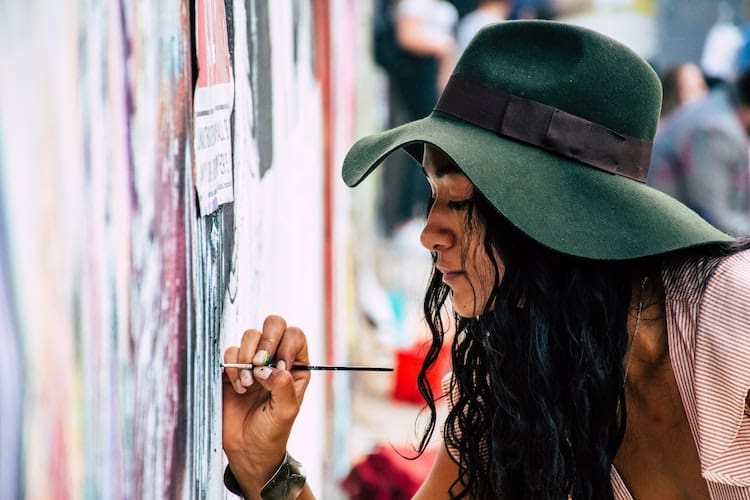Creative arts is the umbrella term that describes a group of artistic activities that allow people to use their creativity and imagination to express their feelings and ideas in different mediums, such as art, music, crafts, and movement. Creative arts therapy uses a wide spectrum of art forms to treat a range of medical, mental health, and emotional conditions.
You do not have to have any kind of artistic talent or ability to take part in creative arts therapy. Expressing yourself creatively, regardless of the outcome, helps you get in touch with emotions and experiences that are otherwise difficult to talk about. Instead of talking about these feelings directly via a traditional therapy session, you’ll talk with a therapist about the creative piece you’ve worked on. With the therapist’s guidance, the artwork can be a catalyst for uncovering and resolving psychological and emotional issues.
Types of Creative Art Therapy
There are many different types of creative art therapies, including the following:
- Visual Arts Therapy: Visual arts therapy can involve drawing, painting, coloring, finger painting, sketching, photography, scribble drawing, sculpting, mindful doodling, mandalas, origami, working with clay, collage, or ceramics.
- Drama or Psychodrama Therapy: This form of therapy can involve storytelling, role-playing, puppetry, drama exercises, enactment, improvisations, or theater games.
- Dance/Movement Therapy: This form of therapy can involve dancing, jumping or swaying to rhythms, or mirroring another person’s movements.
- Music Therapy: Music therapy can involve listening to music, performing music, singing, dancing, discussing song lyrics, writing songs, writing music, discussing the imagery in music, learning through music, and musical improvisation.
- Play Therapy: This form of art therapy includes interactive play and playing alone. It can involve board games, card games, games of strategy, active games, puppets, stuffed animals, masks, dolls, action figures, building blocks, construction toys, LEGOs, water and sand play, tea parties, arts and crafts, musical play, toy phones, storytelling, creative visualization, role-playing, dance, and creative movement.
- Bibliotherapy or Writing Therapy: This therapy form can involve reading specific books or poems, storytelling, writing stories or poems, or journaling.
What Are the Benefits of Creative Therapy in Addiction Recovery?
A form of holistic therapy, creative arts therapy is sometimes used in combination with traditional treatments for addiction recovery. People with substance use disorders benefit from creative arts therapy because it allows them to express their deepest thoughts, feelings, and emotions in a nonjudgmental, healthy way. Often these emotions and feelings are too difficult and painful to verbalize. Creative arts gives individuals recovering from drug or alcohol addiction the opportunity to express and work through these feelings so they can attain lasting sobriety.
Many published studies support using creative arts therapies. Research shows creative art therapies enhance addiction treatments, reduce trauma symptoms, and help individuals process traumatic events. They encourage healthy coping skills, boost self-esteem and self-awareness, and improve concentration and coordination. The person learns to express themselves in new non-verbal ways, increasing their creativity and confidence.
Additional benefits of creative arts therapies include:
- Improving communication skills, social skills, and social integration and bonding
- Providing a means of self-expression, communication, positive engagement, and emotional support
- Increasing feelings of relaxation, calm, peacefulness, and satisfaction
- Reducing feelings of anxiety and stress
- Boosting mood and increasing mental skills
- Gaining insight into past events and experiences while attaining personal growth
With the professional therapist guiding them through their sessions, the person in recovery will eventually find they can talk about their painful experiences instead of using alcohol or drugs to escape from them.
Are You Struggling with Addiction?
Overcoming a substance use disorder is not an easy task. It takes hard work, determination, patience, and a daily commitment. You also need to trust the recovery process. If you or someone you love is struggling with an addiction to drugs or alcohol, it is critical to get the right help. At Anabranch Recovery Center in Terre Haute, Indiana, our caring professionals will help you travel the road to recovery.
About the Author: 
Terry Hurley is a retired educational professional and freelance writer with more than fifty years of experience. A former reading specialist and learning center director, Terry loved her years working with children in the educational field. She has written extensively for print and online publications specializing in education and health issues. For the last six years, her writing focus has been on addiction and mental health issues.





